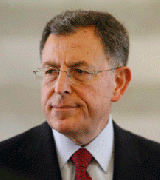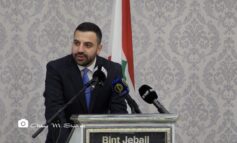
The U.S.-backed March 14 bloc nominated Fouad Siniora as prime minister Tuesday, although members of the Hizbullah-led opposition signaled they were unhappy with Siniora becoming head of the new cabinet. President Michel Sleiman’s office made the announcement on Wednesday, following the president’s meeting with legislators and the nomination of Siniora for the position by the majority bloc in parliament.
“We did not nominate Prime Minister Siniora as a challenge, but for reconciliation and to turn the page,” Saad al-Hariri, the coalition government’s majority leader, said after informing Suleiman of his choice.
Lebanon’s constitution requires the president to appoint the candidate backed by the largest number of legislators.

Siniora’s appointment follows a deal, mediated by Qatar, that ended 18 months of conflict between Lebanon’s governing coalition and the opposition.
“It’s not a huge surprise but it’s an important step to implementing the agreement that was signed in Doha,” said Rula Amin, Al Jazeera’s correspondent in Beirut.
Sleiman himself was elected president on Sunday as a result of the Qatar-mediated deal.
The Qatar agreement was reached after more than 70 people were killed in clashes in cities across the country. Tensions on the street are still simmering.
A soldier was killed during a gunfight between Hizbullah supporters and pro-government loyalists on Tuesday, Lebanese security officials said.
Hussein Mohammed Janadin was caught in the crossfire in the clash at a military post in the village of Aramoun, south of Beirut, officials said.
The soldier is the first person to die as a result of fighting between supporters of political factions since the power-sharing deal.
Tuesday’s fighting came a day after nine people were injured in a gunfight in Beirut, shortly after a speech by Hassan Nasrallah, Hizbullah’s secretary-general.
The clashes suggest that while Lebanon’s leaders have worked out an accord, their respective supporters may be more reluctant to observe the political détente.
In a speech to supporters on Monday, Nasrallah hailed Sleiman’s election as president, calling it a new chapter for Lebanon.

“[Sleiman’s] inaugural speech expressed the spirit of consensus that he promised to act upon in the upcoming period… And this is what Lebanon needs.”
Nasrallah said that Hizbullah did not want to take over the country or undermine political institutions.
“I am speaking as Hizbullah — we don’t want power or authority, we don’t want to rule Lebanon, we do not want to impose our thoughts on the Lebanese,” he said.
He also said that the group expects to make a prisoner swap with Israel soon.
“Samir Kantar [Israel’s longest-held Hizbullah prisoner] fighter and his imprisoned brothers will be among us very soon, God willing,” Nasrallah said.
According to the Jerusalem Post newspaper, the exchange is to be conducted within 30 days.
Israeli Army Radio also said that the swap is likely to involve two Israeli soldiers captured by Hizbullah in 2006, which sparked a 34-day war between Israeli and Hizbullah forces.
A Lebanese-Israeli man who was sentenced to six years in jail by Israel in 2002 for having contact with Hizbullah will be released in less than a week, his family said on Tuesday.
Nasim Nisr’s Israeli lawyers told the family he will be released on Sunday and deported to Lebanon, the prisoner’s older brother, Omran, said.
However, he said his brother’s release was not part of a prisoner swap hinted at by Nasrallah.
Israel has not commented on the potential release or on Nasrallah’s prediction of a prisoner swap.
Al Jazeera and agencies






Leave a Reply